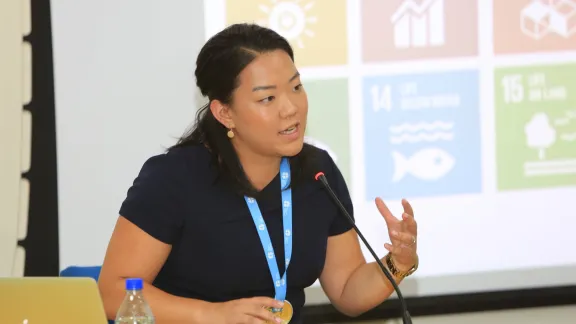
PARAMARIBO, Suriname/GENEVA, 30 August 2016 (LWI) — Many member churches of The Lutheran World Federation (LWF) are already engaged with the global Sustainable Development Goals (SDGs) that address the root causes of poverty, marginalization and exclusion in communities around the world.
A public forum on the United Nations SDGs held in the context of LWF Pre-Assemblies for Latin America and the Caribbean (LAC) and North America, heard how congregations and church institutions in Brazil, Costa Rica and the United States are reaching out to thousands with food, clean and safe water, and supporting local networks in fighting violence against women.
The forum at the regional Pre-Assemblies are aimed at creating a common framework on how the global communion can engage with the SDGs. Member church delegates reflect together on the theological basis for such involvement, and also discuss possible partnerships with ecumenical and other civil society actors.
The majority of people living in poverty in Brazil are women, said Rev. Cibele Kuss, executive secretary of Lutheran Foundation of Diakonia (FLD), the social service delivery arm of the Evangelical Church of the Lutheran Confession in Brazil (IECLB).
Her presentation at the SDG forum focused on how the FLD collaborates with more than 60 community-based organizations and networks to reduce gender inequalities that increase poverty and further marginalize women and youth. “We want to show that the church has a voice, a transformative perspective of development that is systemized through our structures,” she added.
It is a huge task for a church that is small. We may not see all the results of our work yet, but it is important to keep going, so that the young people, women and those who are socially excluded can have a future where their lives are not so complicated."
Zero hunger
Ms Mikka McCracken, director for planning at the World Hunger program of the Evangelical Lutheran Church in America (ELCA) talked about the church’s support to communities that face chronic hunger in the country and around the world.
“Hunger is not caused by scarcity, it is caused by inequality. One in seven people in the US are food insecure,” she said, adding, many families face uncertainty about affording their next meal and adequate nutrition. “Today’s problems are becoming more complex, and the rich and poor have to work together to realize SDG 2 on ‘Zero Hunger’, McCracken said.
Since its establishment in the 1970s, ELCA World Hunger had raised more than USD 500 million towards local and global church diaconal ministries, and it hoped to reach its goal of USD 24 million in 2016. Its 350 domestic ministries include the “Shobi’s Table,” a mobile service providing food and capacity building skills for people living on the margins of society in St Paul, Minnesota. Another 250 ministries across the world include LWF member churches.
McCracken challenged churches to offer hope that an end to hunger “is not only possible but doable because God has provided. … As people of faith we can say yes to zero hunger and gender equity and better serve our neighbor.”
Inclusive communities
Rev. Geraldine Alvarez, vice-president of the Lutheran Costa Rican Church (ILCO), spoke about the church’s work with other Christian bodies and non-governmental organizations to promote justice and build inclusive communities in a diverse society.
“In spite of being a small church, ILCO has done great work over the past 28 years,” she said of the 500-member church that is one of the most outspoken organizations in the country. It caters to the needs of refugees and migrants from neighboring countries, youth, people living with HIV and AIDS, the socially excluded because of different sexual orientation, and helping women from poor backgrounds claim their rights to reproductive health services.
“It is a huge task for a church that is small. We may not see all the results of our work yet, but it is important to keep going, so that the young people, women and those who are socially excluded can have a future where their lives are not so complicated,” she added.
Contaminated water
Rev. Monica Villarreal, pastor of ELCA’s Salem Lutheran Church, presented the health risks faced by the Flint community after authorities changed the water source from the city of Detroit to the Flint River in 2014. This exposed residents, many from Spanish-speaking backgrounds, to high levels of lead in the drinking water.
Three years later, 12 people have died from causes related to lead-contaminated water and children are still exposed to the threat, Villarreal said. ELCA’s intervention includes daily distribution of thousands of bottled water to households for domestic use, and faucets to filter water. But by and large, the authorities have not resolved the crisis, which affects more than 99,000 people, she said.
The pastor herself was compelled to make practical adjustments in her work. “Water is the foundation of our life together. I now baptize using bottled water donated by the church.”
Commitment to partnerships
The 17 global goals include commitment to establish partnerships in order to facilitate implementation. Marci Gompers, office for environmental coordination in the Cabinet of the President of the Republic of Suriname, said the government’s SDGs-related work includes efforts to reduce direct pressure on biodiversity and the eco-system and promoting sustainable use that benefits the entire population. The government was open to partnership with civil society including churches, she added.
LWF Youth Secretary Caroline Bader, who coordinated the forum, said the experiences shared affirmed the churches’ commitment to “LWF’s vision of a world where no one is left behind.”
The LWF Council endorsed the 17 SDG goals as a communion-wide commitment in June 2016.


